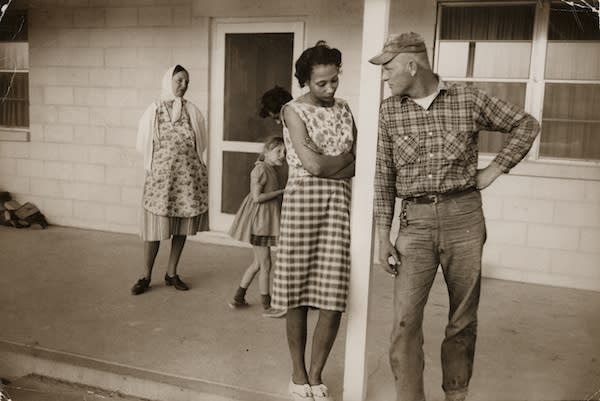Tender Photos Unearthed from a Turbulent Time

When Mildred and Richard Loving married in Washington, D.C. in 1958, they didn't think they were breaking the law. Both were from the small town of Central Point, Virginia. Mildred was of African-American and Native American decent and Richard was white. They did know it was illegal for them to marry in their state-as well as 15 others--which is why they left to tie the knot. Within a month of returning home, police burst into their bedroom in the middle of the night and arrested them under the state's anti-miscegenation law. They were sentenced to a one-year in prison term that could be suspended if they left Virginia.
Related Link: Kentucky Church Bans Interracial Couples from Becoming Members
Banished to Washington, D.C., Mildred Loving, who did not consider herself a political person, wrote about her plight to Attorney General Robert F. Kennedy. The American Civil Liberties Union took up the case and brought it all the way to the United States Supreme Court. In 1967, in a landmark Civil Rights ruling, the court struck down America's laws against interracial marriage.
On the 40 th anniversary of the ruling, Loving issued a statement that read, "I am still not a political person, but I am proud that Richard's and my name is on a court case that can help reinforce the love, the commitment, the fairness, and the family that so many people, black or white, young or old, gay or straight, seek in life."
In 1965, Life Magazine sent photographer Grey Villet to photograph the Lovings and their three children. Writing for the New York Times, Villet's widow Barbara recalled that he approached the assignment with the aim of creating a tender family portrait, not an overtly political statement. "He chose as he did in every essay…to seek out the literal heart of the matter: a love story." However, the images were utterly groundbreaking exactly because of the intimate and emotionally transparent way they portrayed a taboo subject.
Filmmaker Nancy Buirski rediscovered Villet's photographs while making a documentary for HBO called The Loving Story. Twenty of the images are on display at the International Center of Photography in New York City from January 20 through May 6, 2012. The Loving Story will debut on February 14.
Also on Shine:
Should Schools Cut Classes and Ban Books to Avoid Racial Issues
Why Racism Will Be A Key Issue for Liberal Media in 2012
Marriage and the Economy: How Couples are Coping
